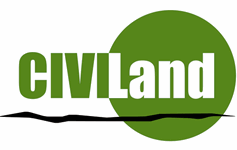- deutsch
- english

Welcome to CIVILand
CIVILand was a research group and had been engaged in payments for environmental and cultural landscape services also called Payments for Ecosystem Services (PES) in the context of civil society initiatives:
From an economic perspective, environmental problems often arise because air, water, soil and other natural resources are considered as freely available everywhere. For several years now, attempts have been made to change this mind-set. Based on the concept of ecosystem services clean air, fresh water and fertile soil are defined as services nature provides for humankind/human societies. The ecosystem services concept helps to communicate the economic value of these natural resources.
CIVILand examined how economic incentives such as Payments for Ecosystem Services can be developed and how they can be applied to preserve ecosystem services or to maintain cultural landscapes.Non-governmental initiatives, especially those from civil society were in the focus of interest. What is the contribution of civil society and non-governmental initiatives to contribute to the preservation and development of ecosystem services? What innovative contributions does civil society make in the development and implementation of PES? CIVILand analysed these questions by comparing PES examples in Germany, Great Britain and the US.
Through their work, CIVILand helped to raise a new perspective in the international discussion on PES.
The research group was based at the Leibniz-Centre for Agricultural Landscape Research (ZALF) and conducted research in cooperation with various partners in Germany and the US. The Federal Ministry for Education and Research (BMBF) funded the junior research group through the research program “Social-ecological Research” (SÖF).
Runtime: 2009 – 2013
Budget: 1.22 Mio. € + co-financing via individual equity stake from ZALF

Output


CIVILand Abschlussbericht: Bedeutung und Innovationspotential der Zivilgesellschaft für die Honorierung ökologischer und kulturlandschaftlicher Leistungen (Report available soon)
© 2026 Leibniz-Zentrum für Agrarlandschaftsforschung (ZALF) e.V.
Online: http://www.civiland-zalf.org/en/index.php
Datum: 16.02.2026
